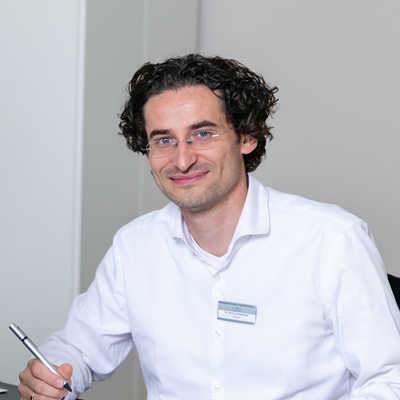Private clinic for somatoform disorders
When physical complaints have no organic cause
Somatoform disorders affect about five to ten percent of Germans – men and women to the same extent. If the diagnosis is made, those affected have usually been suffering from the symptomatology of physical illnesses and chronic pain for at least two years, without these being physically justifiable.
Not only the long and complicated patient journey but also the many negative examination results and the increased everyday burden in the social, interpersonal, and family spheres have an enormous impact on the lives of those affected. As a result, they live in constant concern for their lives and health and seek out various doctors simultaneously to find the cause. In doing so, many affected persons also expose themselves to an actual health risk by taking different prescribed medications in parallel without taking into account a mutual agreement between the treating physicians. On the other hand, other sufferers of somatization disorder radically change their way of life. Let our experts advise you without obligation at +49 3996 140490.
Symptoms Somatoform disorders
Symptoms of the somatoform disorder can occur in any body organ system and any part of the body. The most common are as follows:
- Back pain, arm pain, leg pain
- Feeling of shortness of breath, shortness of breath
- Pain during urination, lower abdominal pain
- Chest pain, feeling of pressure, heart pounding, heart stuttering
- Abdominal pain, digestive problems, nausea, feeling of fullness
- Migraine
- Skin irritation
- Sexual unwillingness
- Menstrual cramps, potency problems
Risk and trigger factors
The following factors promote somatization disorders:
- Stressful situations with high periods of tension
- Experiences of loss and separation
- Overburdening
- Unconscious conflicts
- Interpersonal stress processes such as anger, resentment, despair, traumatic experiences, dissatisfaction with self and environment
- Feelings of helplessness, disappointment, and worthlessness
- Difficulty expressing emotions adequately
Causes Somatoform Disorders
A wide range of factors can be considered as causes of somatoform disorders. Stress factors and traumas in early childhood and adolescence are particularly relevant. Nevertheless, different theories are considered, which try to explain the somatoform disorder in its development in an understandable way:
- The psychoanalytic model: internal conflicts are externalized through the body
- The learning-theoretical explanatory approach: recurring behavioral patterns solidify the somatization disorder to the extent that the affected person cannot break the vicious circle on his or her own
- The neurobiological model: heritability is not an exclusion criterion; the central nervous system increases the sensitivity to pain

